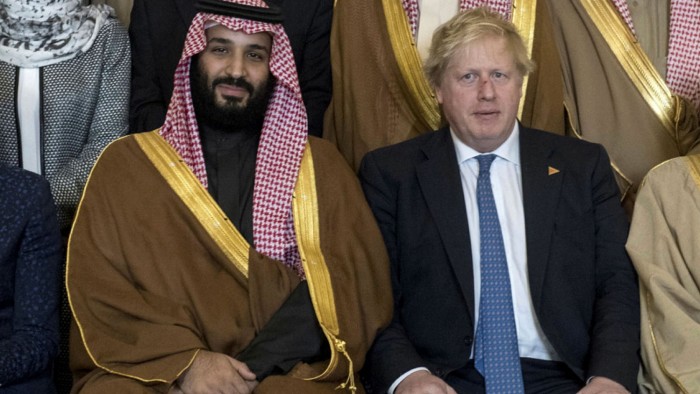Boris Johnson to appeal to Saudi Arabia to increase oil production

Roula Khalaf, Editor of the FT, selects her favourite stories in this weekly newsletter.
Boris Johnson, UK prime minister, is facing a daunting diplomatic mission this week to persuade a reluctant Saudi Arabia to pump more oil to ease market volatility following Russia’s invasion of Ukraine.
Downing Street said Johnson would be speaking to the Saudis on “a wide range of issues, not just energy supply”, but simultaneously criticised Riyadh over a mass execution at the weekend.
Britain denounced the Saudi execution of 81 individuals on terrorism and related charges on March 13. Foreign Office minister Amanda Milling said the UK was “shocked”.
“No aspect of our relationship with Saudi Arabia prevents us from speaking frankly about human rights,” Milling told the House of Commons, repeating Britain’s strong opposition to the death penalty.
Number 10 refused to confirm whether Johnson would travel to Saudi Arabia this week, but two officials familiar with his plan said Johnson would visit Riyadh to push for more production to offset the loss of Russian oil.
It was not immediately clear whether the trip had been finalised, however. The Saudi government did not immediately respond to a request for comment.
Saudi Arabia has rebuffed US pressure to increase production. The two traditional allies have had icy relations since US president Joe Biden came to office vowing to turn the kingdom into a pariah over human rights concerns. The UK has better relations with King Salman and his son, the crown prince and day-to-day ruler Mohammed bin Salman.
But Saudi officials have argued that their stance on production is unrelated to their dispute with Washington, and that it rests on market demands. They say there is no shortage of oil and raising production might not affect prices while it would reduce their spare capacity.
Since the invasion of Ukraine, Saudi Arabia has publicly repeated its commitment to the Opec+ agreement in which producers agreed a monthly increase of 400,000 barrels a day. Russia is part of Opec+ and Moscow and Riyadh have co-ordinated production levels since late 2016. Gulf states have shown no appetite to divert away from Opec+ since Russian troops invaded Ukraine.
Brent neared its all-time high after the invasion of Ukraine and has since climbed down to $105.
It is uncertain whether Johnson would be able to persuade Saudi Arabia, the world’s largest oil exporter, to change its stance. At a briefing on Monday, a spokesman for the UK prime minister acknowledged there were “no quick fixes”, but added: “We want to reduce volatility.”
Johnson had planned a visit to Riyadh earlier this year but that was called off because of the threat of Russia’s invasion of Ukraine, according to a British diplomat. Unlike Biden, Johnson has courted the crown prince, in part hoping to attract more Saudi investments in the UK and seal a trade agreement with the Gulf Cooperation Council.
Twice weekly newsletter

Energy is the world’s indispensable business and Energy Source is its newsletter. Every Tuesday and Thursday, direct to your inbox, Energy Source brings you essential news, forward-thinking analysis and insider intelligence. Sign up here.
If he visits Saudi Arabia this week, the timing will questioned by critics as it would come days after the mass execution.
The interior ministry said many of the 81 people executed had been involved in Isis and al-Qaeda attacks, or worked with the Shia Houthi rebels in Yemen. Anti-government activists claimed that half of the executed men were from Saudi Arabia’s Shia minority.
Last week Liz Truss, UK foreign secretary, said in a speech in Washington that the west needed to end its “strategic dependence on authoritarian regimes for our energy and for other vital resources”.
But Johnson’s expected visit to Saudi Arabia suggests she was referring primarily to Russia rather than Britain’s ally in the Middle East.
Comments